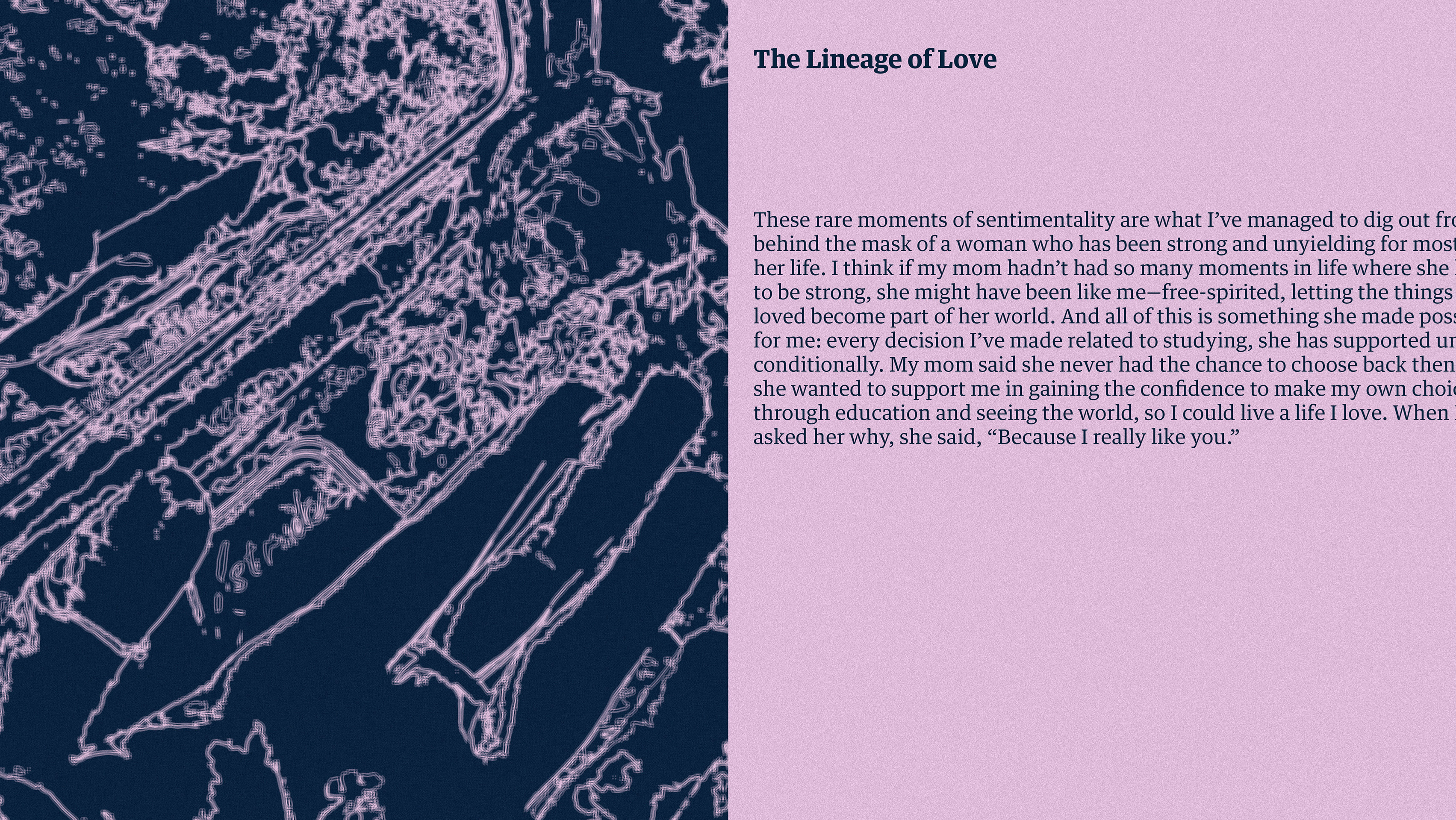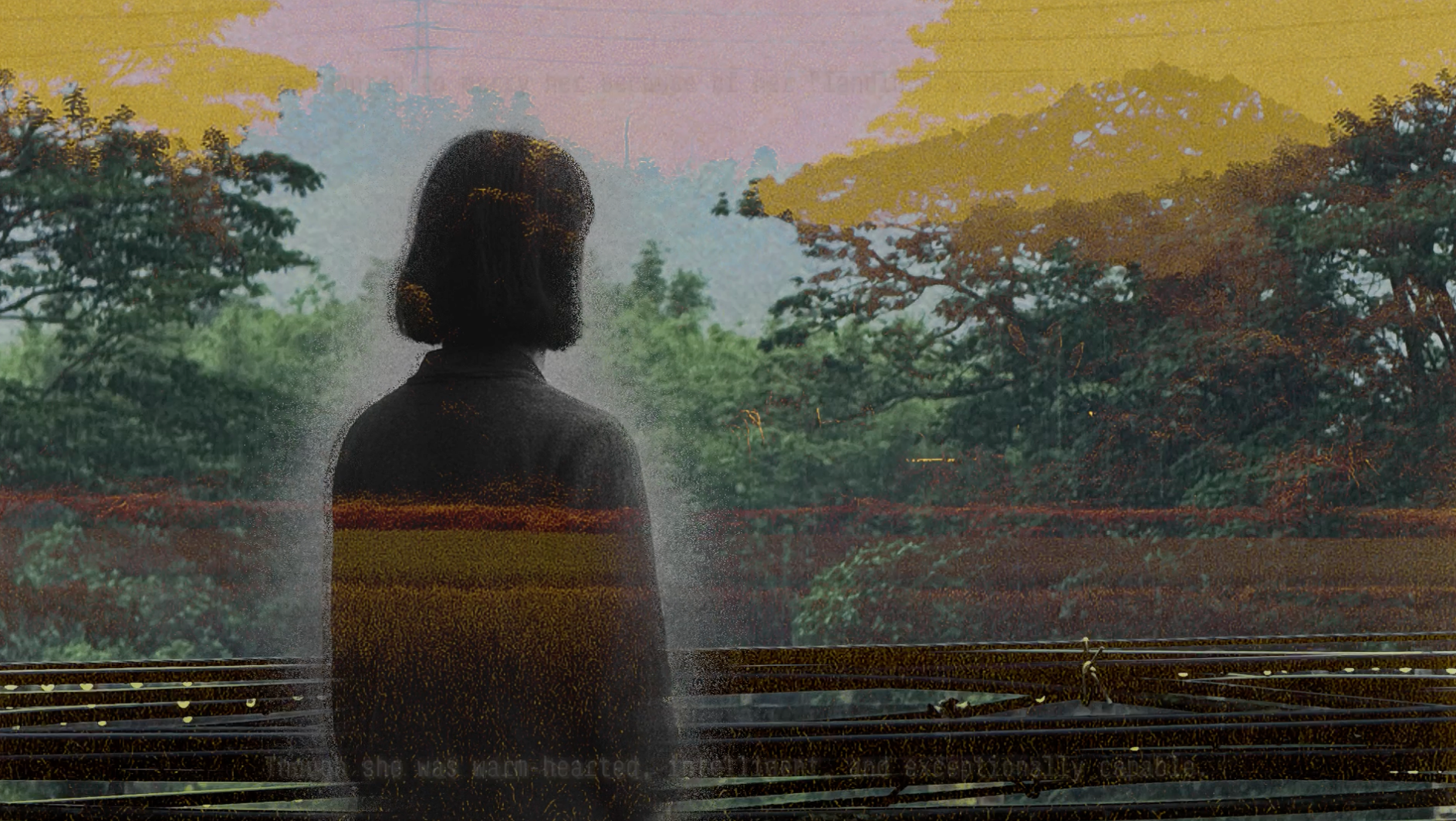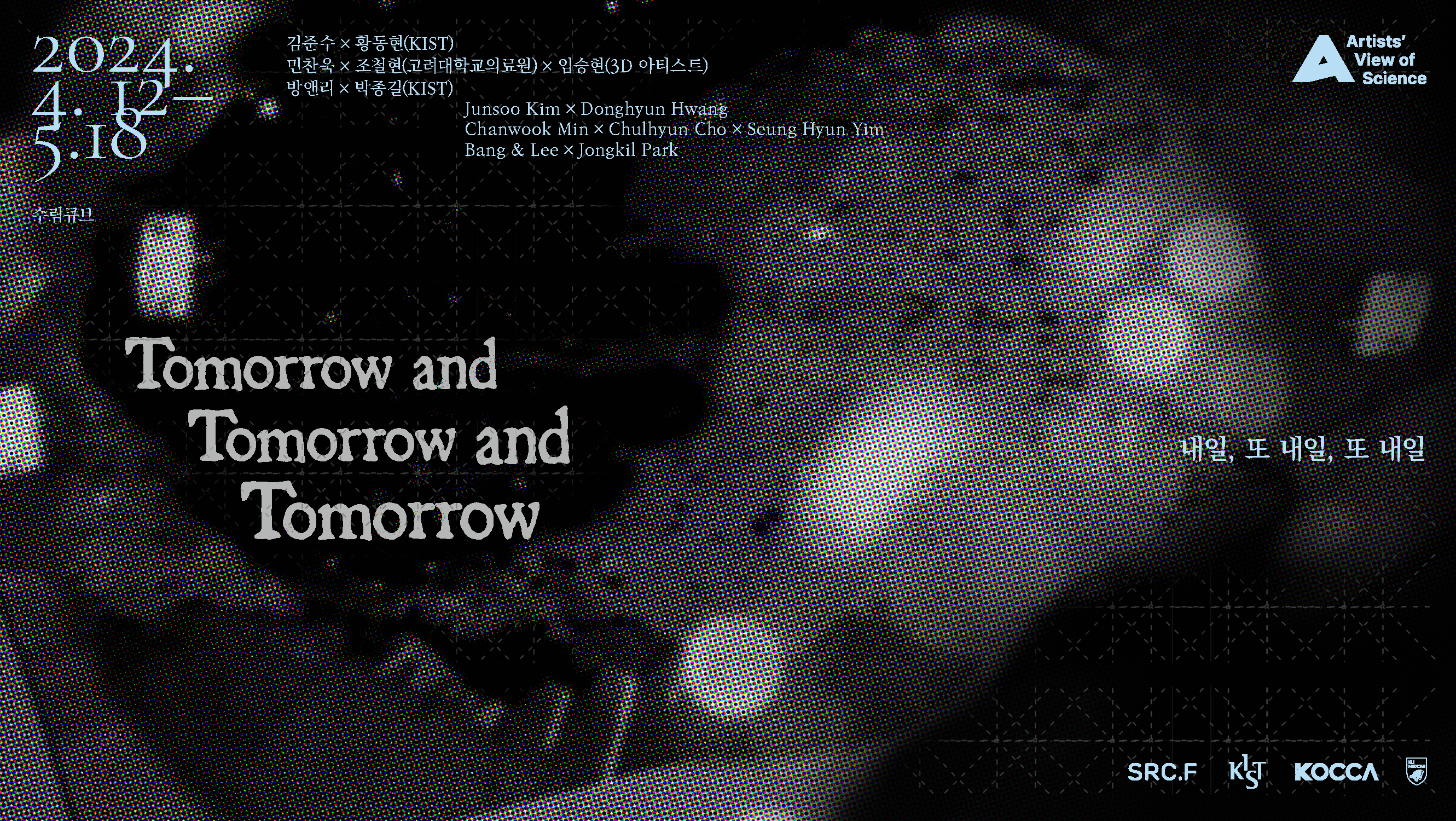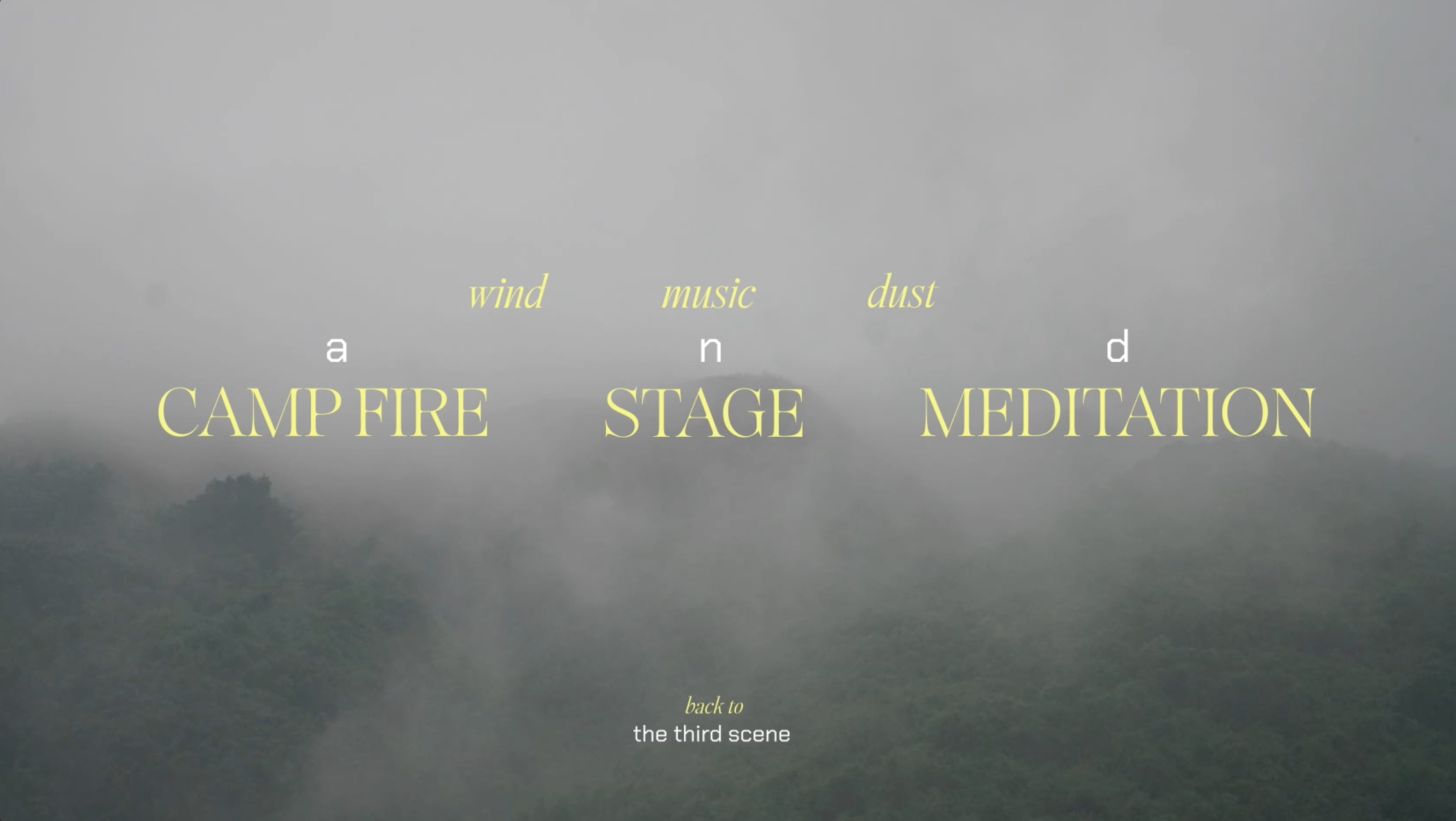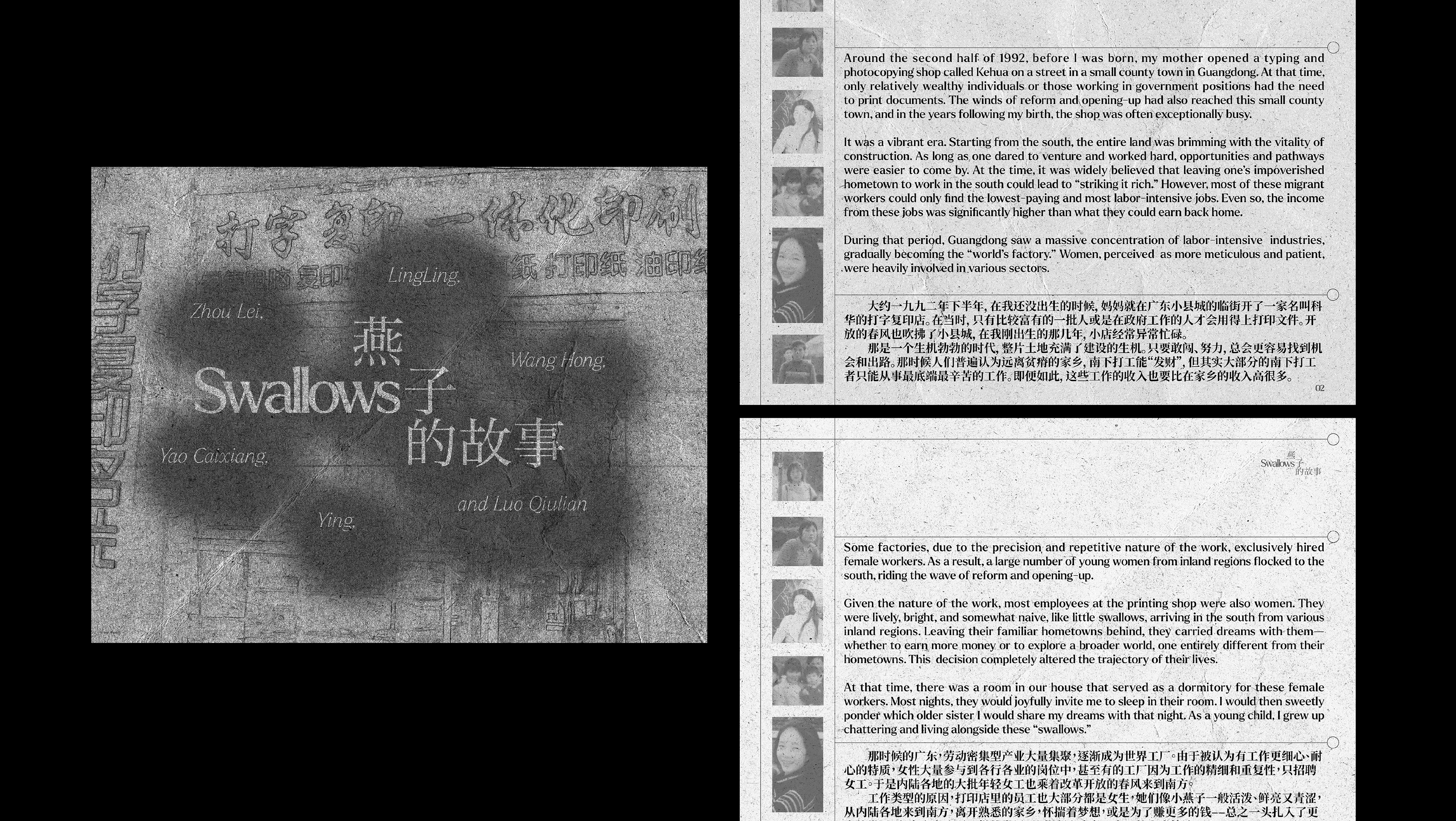Silenced Narratives is a three-part project that brings together poetry, personal essay, and motion-based image-making to trace the inter-generational legacies of female migration. Grounded in oral histories and family memory, the work meditates on the strength, grief, and survival of women whose stories were often left undocumented—women who endured political upheaval, displacement, and silence across the twentieth century in southern China.
The poem introduces a rhythmic meditation on uprootedness, using the metaphor of dandelions—fragile yet persistent—as a way to speak of inherited resilience and scattered belonging. The accompanying prose, a personal narrative spanning generations, recounts the strength of the artist’s great-grandmother and mother, and the emotional migration of the artist herself: from survival toward self-definition. The motion component brings these layered histories to life through abstracted textures and visual metaphors, embodying memory where documentation is absent.
The poem introduces a rhythmic meditation on uprootedness, using the metaphor of dandelions—fragile yet persistent—as a way to speak of inherited resilience and scattered belonging. The accompanying prose, a personal narrative spanning generations, recounts the strength of the artist’s great-grandmother and mother, and the emotional migration of the artist herself: from survival toward self-definition. The motion component brings these layered histories to life through abstracted textures and visual metaphors, embodying memory where documentation is absent.
Together, these three forms create an affective archive—where fractured lineage, personal loss, and cultural displacement become legible not through chronology, but through sensation, rhythm, and storytelling. Silenced Narratives honors the lives of women who drifted, stayed strong, and left behind echoes in their descendants’ search for home.
Aa Baak — the mother of my grandfather — was a woman of extraordinary toughness. She raised my mother and her siblings, becoming the quiet, unwavering center of our scattered family. When I was a child, she lived with us. Parkinson’s disease had already taken much of her memory, but her spirit burned on — stubborn and luminous. She lived to the age of 96, defying the slow erosion of her body with a vitality that seemed carved from another time.
Endurance Through Eras
Her life spanned the violence of war and the upheavals of a transforming nation. During the war, she witnessed her husband being shot from a Watchtower. In those dangerous days, no one dared to step outside openly, and so she waited through the long hours of nightfall, enduring unbearable grief in silence, until she could carry his body back under the cover of darkness. Years later, after the founding of the new state and the gradual reopening of borders, she once again proved her resilience — walking nearly 110 miles on foot to Hong Kong to sell chickens and sustain her family.
Her life spanned the violence of war and the upheavals of a transforming nation. During the war, she witnessed her husband being shot from a Watchtower. In those dangerous days, no one dared to step outside openly, and so she waited through the long hours of nightfall, enduring unbearable grief in silence, until she could carry his body back under the cover of darkness. Years later, after the founding of the new state and the gradual reopening of borders, she once again proved her resilience — walking nearly 110 miles on foot to Hong Kong to sell chickens and sustain her family.
Through every change, every cruelty history imposed, Aa Baak endured. She bore suffering not with complaint but with a fierce will to survive, quietly stitching her life through eras that broke so many others.
Growing in Adversity
My mother inherited that same strength. After her parents' divorce — a separation born from political persecution when her mother’s family was labeled as Capitalist Landlords — she was left to navigate a world that turned its back on them. Her stepmother treated them with cruelty, and my mother, still a child herself, became the caretaker of her younger siblings. Her brother, my uncle, later went missing — a casualty of a broken education system and a life pulled apart by addiction. And still, my mother stood firm, carrying the weight no one else would.
My mother inherited that same strength. After her parents' divorce — a separation born from political persecution when her mother’s family was labeled as Capitalist Landlords — she was left to navigate a world that turned its back on them. Her stepmother treated them with cruelty, and my mother, still a child herself, became the caretaker of her younger siblings. Her brother, my uncle, later went missing — a casualty of a broken education system and a life pulled apart by addiction. And still, my mother stood firm, carrying the weight no one else would.
Her story, too, is a migration — not merely a leaving of places, but a leaving of safety, of belonging, of the right to be a child. She learned to survive where tenderness was scarce, and later, as a single mother, she raised my brother and me with the same unyielding spirit.
Seeds in the Wind
In my mind, both Aa Baak and my mother are like dandelions — uprooted again and again by forces larger than themselves, yet carried forward by an instinct to live, to grow, to make something lasting wherever they landed.
In my mind, both Aa Baak and my mother are like dandelions — uprooted again and again by forces larger than themselves, yet carried forward by an instinct to live, to grow, to make something lasting wherever they landed.
Becoming Through Wandering
And I, too, am part of their story. My mother’s sacrifices carved a space for me to dream beyond survival — to step into a larger world, to keep searching for a place I might call my own. Compared to them, my migration feels different: it is not just a migration of the body, but of identity itself.
And I, too, am part of their story. My mother’s sacrifices carved a space for me to dream beyond survival — to step into a larger world, to keep searching for a place I might call my own. Compared to them, my migration feels different: it is not just a migration of the body, but of identity itself.
